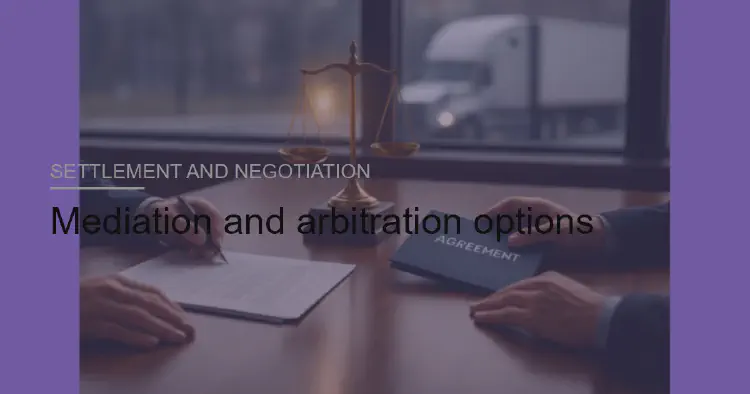Mediation and arbitration options
Not all truck accident cases go to trial. Many are resolved through alternative dispute resolution (ADR) methods like mediation and arbitration, which can save time, costs, and stress for both parties.
- Truck Accident Law Team
- 2 min read
Article 1 of 6 in Settlement and Negotiation/

Mediation and Arbitration in Truck Accident Cases
Mediation
- Definition: A voluntary, non-binding process where a neutral mediator helps parties negotiate a settlement.
- Process:
- Mediator facilitates discussions between the plaintiff and defense.
- Each side presents its perspective and evidence informally.
- Mediator suggests compromises but does not impose a decision.
- Benefits:
- Less costly and faster than trial.
- Maintains control—parties decide whether to accept terms.
- Preserves confidentiality of settlement discussions.
- Limitations:
- Non-binding; if no agreement is reached, case proceeds to trial.
Arbitration
- Definition: A more formal ADR process where a neutral arbitrator (or panel) hears evidence and issues a binding or non-binding decision.
- Process:
- Both sides present testimony, documents, and arguments.
- Arbitrator applies law and issues a decision, often enforceable like a court judgment.
- Types:
- Binding Arbitration: Decision is final and legally enforceable.
- Non-Binding Arbitration: Decision is advisory; parties can still proceed to trial.
- Benefits:
- Faster resolution than trial.
- Often less expensive.
- Confidential proceedings.
- Limitations:
- Fewer opportunities for appeal.
- Arbitrators’ decisions may favor efficiency over full justice.
- Sometimes mandated in contracts, reducing plaintiffs’ choice.
Strategic Considerations
- ADR may be preferable when both sides want to avoid the uncertainty and cost of trial.
- Mediation is often used before arbitration or litigation to attempt voluntary settlement.
- Arbitration may be chosen when parties want finality and quicker resolution.
Summary: Mediation and arbitration offer alternatives to trial in truck accident cases. Mediation emphasizes negotiation and compromise, while arbitration provides a more formal, often binding decision. Both can save time and costs, though they differ in control, flexibility, and finality.